Two weeks before their 3-month-old son was scheduled for his second open-heart surgery, Kyle and Samantha Hatch were told their daughter likely had neuroblastoma.
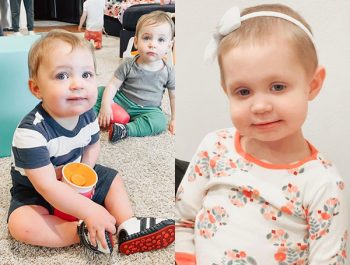
“We were utterly broken,” Samantha said. “But we had to pull it together for our children.”
After Penny’s tumor was discovered on her MRI, she needed a biopsy to definitively diagnose what providers suspected was cancer.
On August 11, 2020, Penny walked into Seattle Children’s hospital for the procedure. It was the last time Samantha and Kyle saw their daughter walk.
After a tumor sample was collected, Penny was discharged. But at home, Samantha said her daughter started screaming in agony. “She couldn’t stand and was in unbearable pain. I thought, ‘This isn’t normal. We’re going back in.’”
Penny was quickly readmitted to Seattle Children’s for pain management. Watching Kyle hold her in the hospital, Samantha noticed Penny was kicking her left leg while her right leg hung limp.
“It was terrifying,” Samantha said. “She couldn’t move it.”
The biopsy caused Penny’s tumor to swell and press against the nerves in her spinal cord, paralyzing her right leg. To make matters worse, the biopsy confirmed Penny did, in fact, have high-risk neuroblastoma.
“It was a huge challenge for them to go through,” said Dr. Danielle Kirkey, Penny’s fellow oncologist. “To have an acute change in their daughter’s mobility and then to receive a diagnosis that turned their life upside down, it was a lot to process.”
After careful discussion, Penny’s surgical team decided to operate that day and remove as much of the tumor as they could. This surgery is typically performed on children with neuroblastoma after several rounds of chemotherapy, but Penny’s paralysis made her surgery urgent.
“It was devastating,” Kyle said. “We felt fear, rage… I started to think I was cursed.”
“It’s a long road. You just put your head down and manage the immediate dangers, the things that keep them alive, like making sure Penny has enough to eat. It’s almost more difficult when things slow down, because you start to process everything you’ve bottled up. We still have a lot of trauma to work through.”— Kyle Hatch, William and Penny’s dad
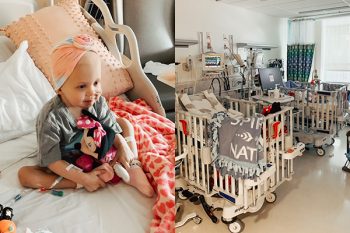
Penny’s attending oncologist, Dr. Tyler Ketterl, met with Samantha and Kyle Hatch shortly after their daughter’s surgery to discuss a treatment plan he’d developed in collaboration with Seattle Children’s neuroblastoma specialists Dr. Julie Park and Dr. Navin Pinto. Penny would need chemotherapy, radiation, a stem cell transplant and immunotherapy.
“Julie and Navin are some of the most experienced providers for neuroblastoma in the world,” Tyler said. “With their expertise, we were able to identify Penny’s exact risk and use that information to decide how much chemotherapy she would need. We also determined she would only need one transplant instead of two.”
Penny started chemotherapy a couple days after her surgery. William was still inpatient, so Seattle Children’s made special accommodations and put them in a shared room.
“Both of our kids’ teams genuinely cared about how the other child was doing,” Samantha said. “They stayed on top of everything for us, like never scheduling overlapping procedures or discharging two kids at the same time.”
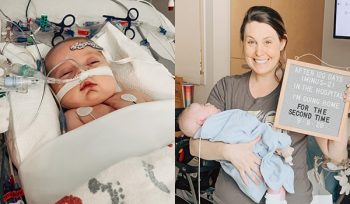 In late August, just two weeks after Penny’s biopsy, 3-month-old William underwent his second major open-heart surgery, known as the Glenn heart surgery, also performed by Dr. Nuri, a cardiac surgeon at Seattle Children’s and Chief of the Regional Cardiac Surgery Program at Mary Bridge MultiCare. The procedure allowed blood from William’s upper body to go directly to his lungs, bypassing the heart and getting oxygenated blood to his organs without overworking his right ventricle.
In late August, just two weeks after Penny’s biopsy, 3-month-old William underwent his second major open-heart surgery, known as the Glenn heart surgery, also performed by Dr. Nuri, a cardiac surgeon at Seattle Children’s and Chief of the Regional Cardiac Surgery Program at Mary Bridge MultiCare. The procedure allowed blood from William’s upper body to go directly to his lungs, bypassing the heart and getting oxygenated blood to his organs without overworking his right ventricle.
A few weeks later — 120 days after he was first admitted — William was headed home. Since then, he’s been able to eat and take medications without a nasogastric (NG) tube and is growing fast. He’s hitting typical developmental milestones not too long after his brother.
William still sees his cardiologist, Dr. Titus Chan, at least every three months and will have a third heart surgery — known as the Fontan procedure — before or around his fourth birthday. At any time, he may also need a heart transplant.
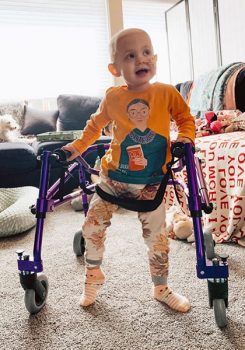
“It’s hard knowing that even if his surgeries are successful, they’re all still palliative, so the procedures work until they don’t,” Samantha said. “And if he does go into heart failure and has to get a transplant, which means somebody else has to die… and that heart is only good for 12 years or so.”
In November 2021, Penny completed her chemotherapy.
“She’s done amazingly well,” Tyler said. “She received all of her first five cycles of chemotherapy without any major complications.” Penny continues to receive physical therapy to learn to walk again and will need orthopedic surgery. “We are proud of Penny every minute of every day,” Samantha said. “She’s an inspiration, she’s my Wonder Woman.”
Because Penny was scheduled to be inpatient at Seattle Children’s on Christmas Eve for conditioning treatment prior to her stem cell transplant, the Hatches celebrated early with a visit from Santa and a gift exchange.
Samantha wrote on Instagram: “2020 has been rough, but we really do have SO much to be thankful for. We welcomed our twins into the world with no complications. Our baby has survived two open heart surgeries, I will forever be thankful for Dr. Nuri, Dr. Arya, and the entire cardiology department at Seattle Children’s Hospital. I’m thankful for Penny’s ‘lucky toe’ for bringing us into the hospital and catching her cancer while her tumor was still localized. I’m thankful for Dr. Danielle (Kirkey), Penny’s fellow, for always being there when we need her. Basically, everyone at Seattle Children’s for saving my kids.”
Christmas was still hard for the Hatches.
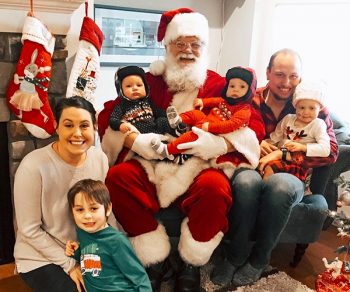
“Behind these smiles and sillies were a lot of tears from mommy today,” Samantha posted on Instagram. “This is not supposed to be how the twins’ first Christmas was. This is the first Christmas in over a decade that I’m not with my husband. I miss my family … seeing everyone’s family pictures around their Christmas trees, with their matching pajamas and healthy families is super hard. I don’t wish this medical life on anyone, and hopefully that will be our family’s picture, all together by our tree next year.”
Penny had her stem cell transplant on Dec. 28, during a time when COVID-19 restrictions only allowed one caregiver at the bedside. In the weeks that followed she struggled with mouth sores, nausea and a bacterial infection. “Words cannot describe how hard it is seeing your child in so much pain,” Samantha said. “The confusion is heartbreaking.”
Well intentioned words that are hard to hear
“‘You’re so strong,’ I have heard that a lot. It’s almost frustrating. I want to tell everyone, ‘You would be strong too if this was happening to you.’ I’m not any stronger than anyone else. I’m just an average, normal person that is having to go through an extraordinary circumstance.
“The other one people say is, ‘You’re their parent for a reason, because you’re such a good mom.’ I always want to be like, ‘So if I was a bad mom would my daughter not get cancer?’ Because I would do anything for my children to not be sick. I know that it comes from a good place, but it’s hard to hear.
“What helps more is acknowledgement that I’m doing a good job, because this is hard. I didn’t go to medical school; we get a quick tutorial and are sent home with central lines and NG tubes. So just hearing, ‘You’re doing a good job,’ goes a long way.” — Samantha Hatch, William and Penny’s mom
In February 2021, Penny started six weeks of radiation treatment. The following month she had various scans to look for any remaining active cancer cells. Every test came back clear; Penny was in remission.
“For such a long time, it was bad news after bad news, blow after blow, so to hear Penny was cancer-free was almost unreal,” Samantha said. “We’re really lucky that both of the kids are doing so well.” 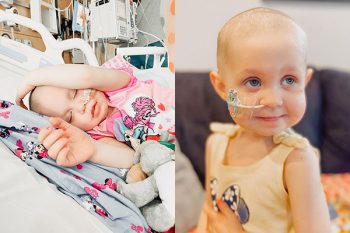
Despite being in remission, Penny still has to complete her scheduled therapy. She is currently in the final phase of her treatment: five months of immunotherapy. Initially, Penny struggled with pain, nausea and dehydration before providers found a combination of medications that made her more comfortable. If she can stay on schedule, Penny will finish treatment just before her third birthday — Sept. 30.
Shortly after Penny started immunotherapy, the Hatches took William to the ED with concerns about his breathing. It turned out he just had a cold, but even that can be serious for a child with HLHS.
“I was afraid his heart was failing and he was going into cardiac arrest,” Samantha wrote on Instagram. “I was afraid he was going to be on the transplant list by the end of the day. This is the life of a heart mom. Constant worry and constant gratitude that my son is still here.”
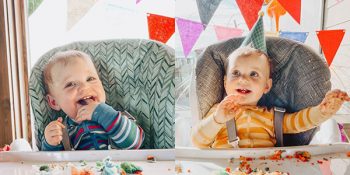
On May 12, the Hatch family celebrated William and Theodore’s first birthdays.
By making it through his first two surgeries and reaching his first birthday, William’s chance for long-term survival is now about 90%.
“I finally feel like he has a life ahead of him,” Samantha said. “I’m eternally grateful for the skilled team at Seattle Children’s for giving my little guy a chance at life.”
Still, thinking about William’s future is difficult for Samantha and Kyle.
“We don’t really know what his potential life expectancy is,” Samantha said. “I want him to want to go to school for a future we aren’t even sure he’ll have. I want him to feel like he can fall in love and get married and do all the things that I feel so fulfilled having done; I think that’s something I might be struggling with more than he will.”
“I worry that I won’t be able to help him navigate parts of his life that I know nothing about,” Kyle said. “Whether that’s not being able to participate in sports or the fact that he will be a hundred times more likely to die on any given day than every other child in his school, I don’t know how I’m going to help him when I can’t relate.”
“William’s illness has made it clear to me that death is just as natural as life. You can’t put a number on how long a successful life is. Maybe he’ll only live a year or four or whatever, but life isn’t graded in years.”
— Kyle Hatch, dad of William and Penny
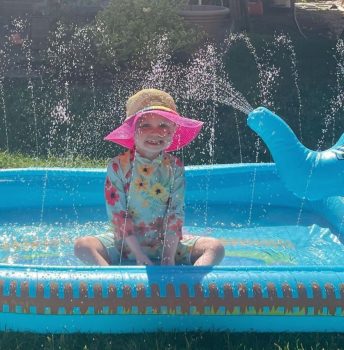
Penny continues to receive immunotherapy treatments, which she is handling relatively well. She recently started taking medications by mouth after her NG tube came out at home.
“With Penny’s cancer treatments, there are going to be side effects, possibly long-term effects,” Samantha said. “Chances are, saving her from this cancer will probably cause her to have another cancer down the road. The treatments have also taken her fertility, and that hurts my heart. Our whole family has been robbed of so much in this last year, we’ll never go back to the way things were.”
Still, Samantha and Kyle are starting to see a light at the end of this very long tunnel.
“With both kids doing so well, we’re starting to make plans for the future,” Samantha said. “So much is still unknown, but we’re excited to see what happens.”

